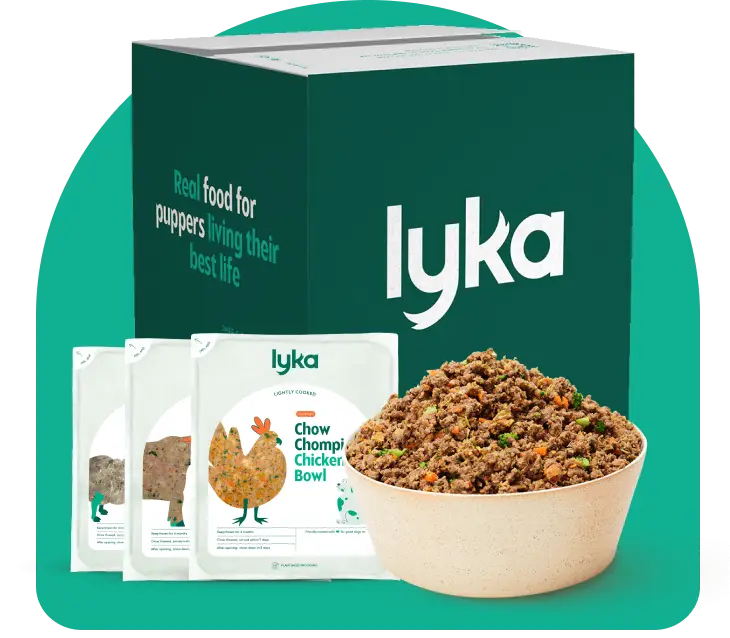Our new bioplastic packaging: an Australian first!

By Tara Wesson

Have you got plastic reduction goals? So do we. We’re the first company in Australia to use bioplastic for vacuum-packed food — for puppers or humans.
Meet our most sustainable Lyka pouches
Our new meals packaging is made from sugarcane rather than fossil fuels. Lyka is the first company in Australia to use this material — a bioplastic thermoforming film.
What does this mean for you?
Our new meal packaging is still a soft LDPE bioplastic, but it will now be carbon negative and renewable. We’ll be rolling out this change over the coming weeks, as we run out of our existing packaging. You can still recycle your pouches with certain local councils, disposing of them in the same way you have done until now.
From the sugarcane farm to your Lyka box
You’ll be able to hold this new packaging very soon! But until then, let’s work backwards. What are the steps that take this material, from a sugarcane farm to your home?
Whenever farmers cultivate sugarcane, it consumes and absorbs carbon dioxide (CO2). CO2 is stored by the plant until it dies and rots, with the carbon dioxide being released back into the environment.
In the case of our bioplastic, the harvested sugarcane is transported to the nearby manufacturing facility — minimising the carbon cost of transportation. The facility is powered by a combination of solar energy and biomass from leftover sugarcane, which eliminates nearly all production waste!
The transformation of sugarcane into bioplastic permanently stores the carbon within the plastic, stopping it from being released back into the atmosphere. This makes our new bowl packaging a carbon sink, as it permanently removes more carbon emissions than it takes to produce.
This technology is available thanks to our partners at Grounded Packaging. With your support, we are reducing the effects of climate change.
Did you know we’re plastic negative?
For every piece of plastic used in the process of cooking up your pup’s meals, we remove double from the environment. Each bowl requires an average of 3.4g of plastic to make — which we take back out of our oceans through our partners at rePurpose. If a standard 600mL water bottle weighs 12.0 grams, your pupper is removing over 200 bottles each year, on average!
How big is our plastic problem?
Every year, humans generate four times their body weight in waste — about 2.12 billion tons. Australia’s plastic production has doubled in the last two decades, with 84% being sent to landfills.
Australia complies with international agreements to manage waste, ranking 7th worldwide for our efforts to control plastic pollution. On home shores, we’ve made particular progress with the banning of single-use plastics.
However, less than 15% of our waste is recycled.
This problem is not limited to Australia, and exists on a global scale. It’s led to the formation of the Great Pacific Garbage Patch – an enormous “soup” of floating plastic.
The difference between bioplastic and biodegradable plastic
“Bioplastics” and “biodegradable plastics” might sound the same, but they have very different meanings.
Bioplastics (or bio-based plastics) are made using organic matter. They convert carbon captured by plants into plastic and thus are great for storing carbon permanently.
Biodegradable plastics can break down completely over a certain period. They reduce waste as they don’t leave a trace after biodegrading, but still release the carbon back into the environment as they decompose.
The choice between bioplastic or biodegradable plastics is a trade-off, between reducing carbon or reducing waste.
Previously, our meal pouches were made from soft recyclable LDPE (Low-Density Polyethylene) packaging, and emitted greenhouse gases during the production process. Our new bioplastic is now carbon negative. Check out the full guide to our product packaging for more information.
Where we’re headed next
We’re still on our journey to reduce the use of plastic: from our packaging to our internal processes. Here are a few steps we’ve taken recently:
Working with our meat suppliers so we receive ingredients in waxed cardboard boxes rather than plastic liners.
Using biodegradable or recycled supplies in our kitchens, warehouses, offices and bathrooms — even down to our bin liners, gloves and pallet wrap!
Collecting and sorting plastics at our meals production facility. The soft and hard plastic is taken to a local recycling plant where it’s sorted, cleaned, shredded and turned into new plastic products. This includes anything from builder’s wrap to furniture and wheelie bins.
Volunteering at Clean Up Australia events to pick up waste in polluted areas.
The bottom line? Our choices have a knock-on effect. No matter how small they may seem. By choosing to feed your pup Lyka, we can pioneer this innovative technology together.
Whether it’s in Australia or the middle of the Pacific Ocean, let’s reduce our plastic waste as a community.





